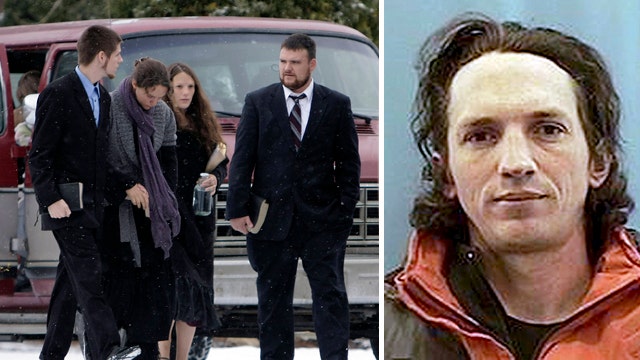Confessed serial killer in hell says family
Relatives of man who admitted to killing eight people and committed suicide in jail gather for his funeral
ANCHORAGE, Alaska – An Alaska man who confessed to killing at least eight people across the country had researched Ted Bundy and other serial killers, saying he recognized himself in them, investigators said Monday.
But Israel Keyes told Anchorage authorities his ideas were his own. And most of all, he never called himself a serial killer, Anchorage homicide Detective Monique Doll said.
"In fact, that was one of those things that he wanted very much, as this investigation progressed, to keep from being identified as," she said.
Those details were among information Anchorage police and FBI investigators released about Keyes, who authorities said never showed any remorse, but spoke of getting a rush out of hunting for victims and killing them. He also tortured animals as a child, investigators said.
Keyes, 34, was found dead in his jail cell Dec. 2 after slitting a wrist and strangling himself with a rolled up bedsheet. Bloody, illegible notes found in his cell have been sent to the FBI lab at Quantico, Va.
- Judge denies George Zimmerman’s request to remove 24-hour GPS
- California road rage incident leaves one dead, another facing murder charges
- Florida woman found guilty of 1st-degree murder, gets life in lottery winner’s slaying
- Alaska man behind murders said to have killed for pleasure, FBI says
- 5 dead, 2 children wounded as man opens fire on relatives at Calif. Indian reservation
- Made for TV? Wanted in connection with a murder, McAfee sells life story
Keyes was set for a March trial in the February slaying of Anchorage barista Samantha Koenig, who was abducted from the coffee stand where she worked. Investigators say the 18-year-old was raped and strangled, her body left in a shed outside Keyes' Anchorage home for two weeks while he went on a cruise.
Investigators said Monday that Keyes told them he was losing control and that his time between killings was getting shorter, which could explain why he broke his own rule of traveling long distances to find his targets.
"Israel Keyes didn't kidnap and kill people because he was crazy. He didn't kidnap and kill people because his deity told him to or because he had a bad childhood," Doll said. "Israel Keyes did this because he got an immense amount of enjoyment out of it, much like an addict gets an immense amount of enjoyment out of drugs. In a way, he was an addict, and he was addicted to the feeling that he got when he was doing this."
Before he killed Koenig, he had targeted others in Alaska. In a close call in April or May last year, he set his sights on two people at an Anchorage park to try out a silencer he had put on a rifle that would soon be put to use in Vermont. In the Anchorage case, a police officer arrived and told the intended targets the park was closed. Keyes told investigators in an audio recording released Monday that he almost pulled the trigger on all three, but another officer arrived.
"That could have got ugly," Keyes said matter of factly before chuckling. "Fortunately for the cop guy, his backup showed up."
After that, Keyes obtained a police scanner, which he used in the Koenig abduction.
Keyes was arrested in Lufkin, Texas, in March after he used Koenig's debit card. Using the debit card while eluding authorities was part of a fantasy Keyes long had, police said, and so was a $30,000 ransom note Keyes placed at an Anchorage dog park, texting directions to Koenig's boyfriend. Koenig's family could manage to pay only a fraction of that amount.
Three weeks after Keyes was arrested, Koenig's dismembered body was found in a frozen lake north of Anchorage. Keyes told authorities he had disposed of the remains there after cutting a hole in the ice with a chainsaw.
Keyes also confessed to two murders in Vermont, four in Washington state, and one on the East Coast with the body disposed of in New York in the past decade. Investigators said there also could be three other victims, for a total of 11 murders.
The only other known victims are Bill and Lorraine Currier of Essex, Vt. Their bodies have not been found since their disappearance in June 2011. Keyes told authorities he sexually assaulted and strangled Lorraine Currier and shot her husband at an abandoned home, which was demolished and taken to a landfill.
Asked if it's possible Keyes exaggerated the number of victims, investigators said they believed what he told them, and they never caught him in any lies.
Investigators said Keyes enjoyed the media attention his crimes received, tracking stories on the Curriers on his computer. But he quit speaking with investigators for two months between late July and September when he learned his name had been linked to the Curriers by unconfirmed news reports.
"He enjoyed seeing media coverage of his crimes as long as he wasn't connected to those crimes," Anchorage Police Chief Mark Mew said. "He didn't want to see media coverage of himself."
Keyes told investigators the first violent crime he committed was a sexual assault in Oregon between 1996 and 1998 in which he let the victim go. The FBI is seeking more information on that crime.










































